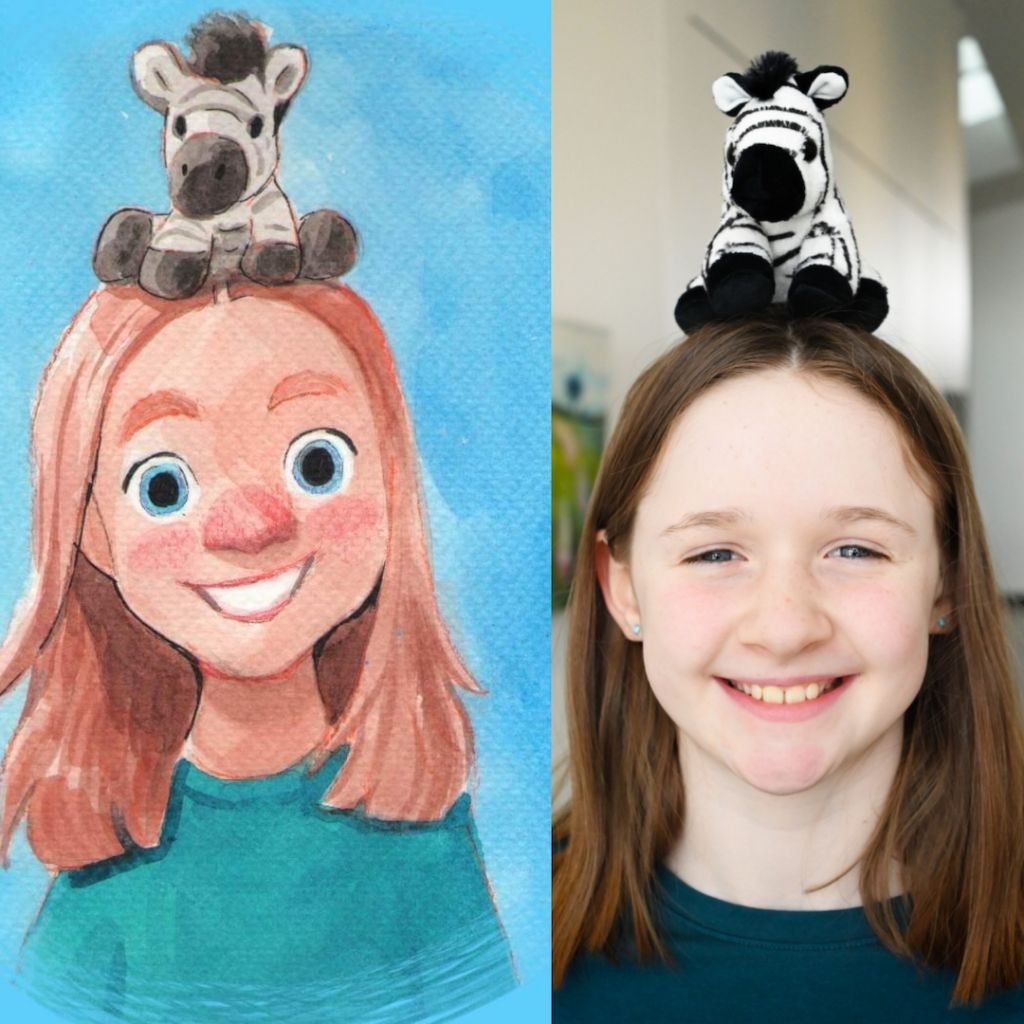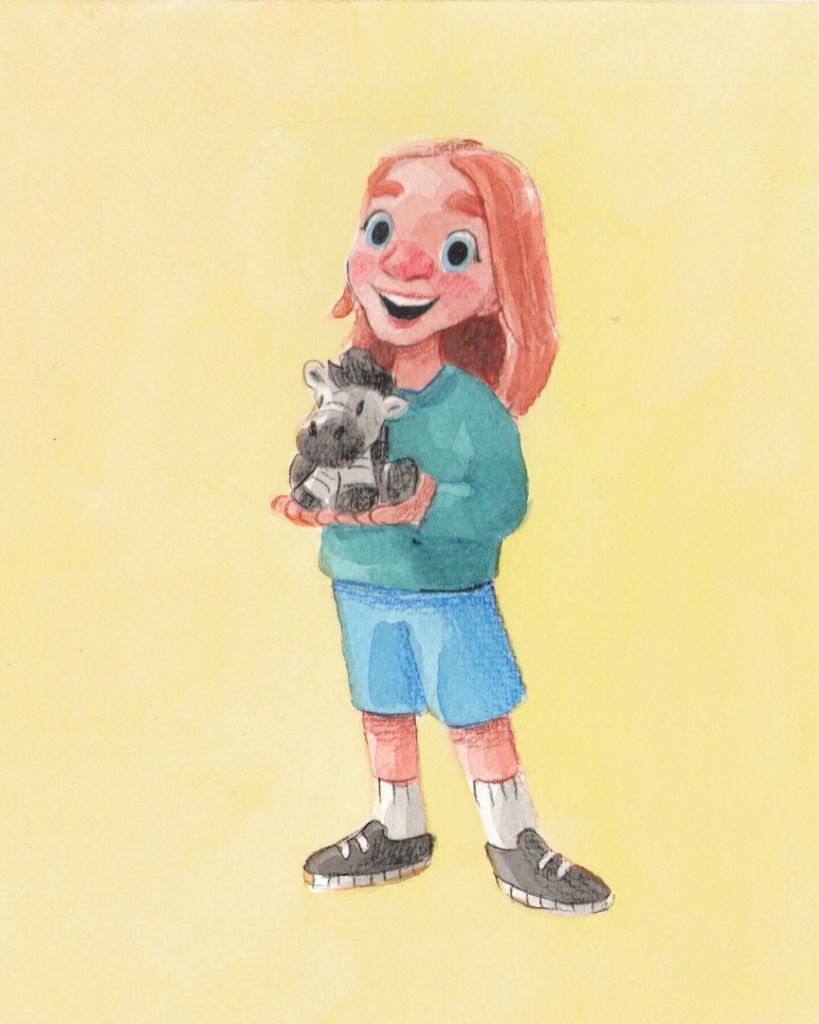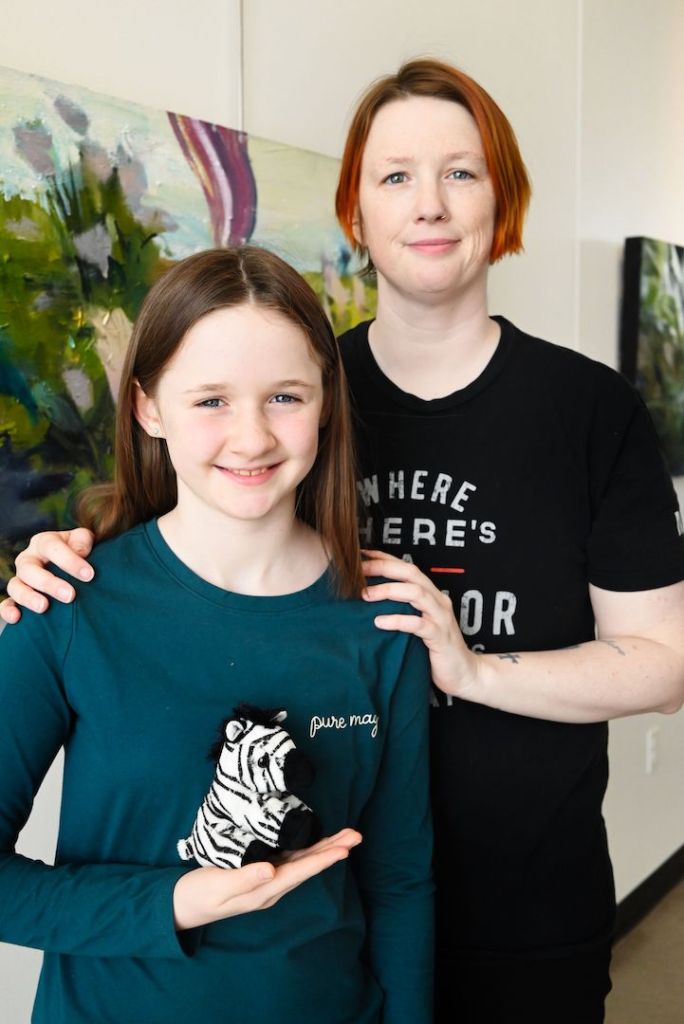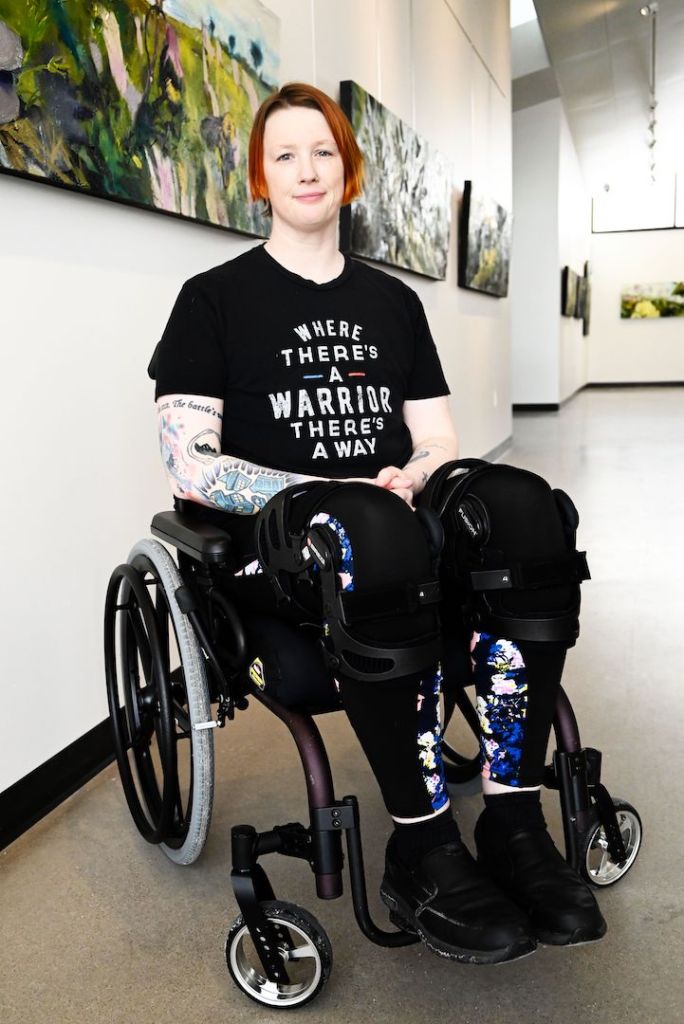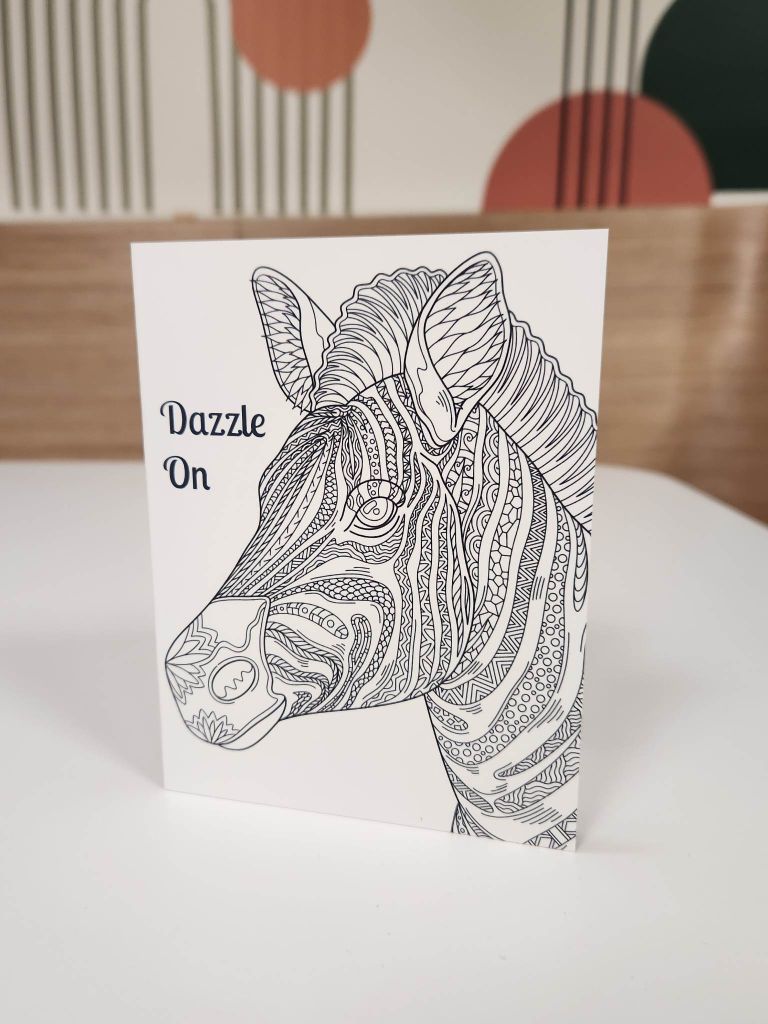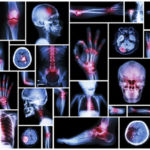Pey Carter, a public speaker and author from Eau Claire, WI, and their daughter, Abigail Bailey, have a children’s book about Ehlers-Danlos Syndrome in the works: Bendy Bones and Stretchy Skin: An Ehlers-Danlos Story. In addition, Pey just finished a Kickstarter for an Ehlers-Danlos coloring book and is working on a memoir of their own. In between literary pursuits, Pey spends the majority of their time speaking and spreading awareness about a variety of issues that they are passionate about. Pey and Abigail took a little time to speak with one of our volunteers, Kate Schultz, in mid-April about their children’s book and Pey’s other advocacy projects.
Kate Schultz: Hello, you two. Thanks for being here today. I’m looking forward to our conversation. Tell me a little about your EDS journeys. When did you first hear about it? How did you come to be part of the Ehlers-Danlos community?
Pey Carter (to Abigail): You want to go first?
Schultz: Hi, Abigail.
Abigail Bailey: Hi, how are you? I figured out I had EDS when I was five-and-a-half, I think.
Carter: You were five, about six, yeah.
Bailey: At the time, I was addicted to doing gymnastics. When I found out, I was heartbroken.
Carter: She was getting into advanced levels at the YMCA at a young age because she was good at it. What’s it been like with school?
Bailey: I mean, it’s good. There are some people who ask questions that aren’t always nice, which gets annoying. I have a special chair.
Carter: So you have accommodations that help.
Bailey: Yes. Right.
Carter: So what accommodations?
Bailey: Oh, I forgot to explain that. (laughing)
Bailey: I have a comfy chair. I take walks every once in a while, just to help with the joints. I have a scribe or keyboard if I do too much writing and my wrist gets sore. Oh, and then at PE [physical education] class, if we’re doing a lot of running, I do something else with a friend.
Carter: If your joints start hurting when you’re doing an activity, you get to do other things.
Schultz: That’s good that your school is supportive like that. I know some schools don’t quite know what to do with students with Ehlers-Danlos, though. We’re actually doing a series of articles right now about school accommodations. It’s great to talk about some that are actually happening.
Carter: She was doing PT [physical therapy], which she graduated from, and has speech therapy as well. Abigail had a lot of ear infections as a kid, which made it difficult for her to hear and pick up on sounds. Because of that, she’s had speech therapy for a few years. (to Abigail) Is that one of the harder things?
Bailey: Hard, annoying, yes, both.
Schultz: I had speech therapy, too, just last year, and I agree; it’s hard. Talking is something that seems to just happen automatically. Breaking it down into the various parts gets complicated.
Carter: Why did you want to do the picture book? Maybe talk about that?
Bailey: Okay, I wanted to do a picture book because I wanted other people to understand that people with EDS have a bit of different lives. I want other people to understand how living with EDS works. I also wanted the people that have EDS to know that some people do actually care. I think I said that right. I wanted kids with EDS to know they’re not alone.
Carter: You wanted kids that don’t need accommodations to understand that sometimes kids have them, and you can’t see why.
Bailey: Yes.
Carter: Because normally, what do you have me do when you start a new grade?
Bailey: Come in and talk about it.
Carter: Mm-hmm.
Schultz: Oh really?
Carter: A presentation to Abigail’s whole class.
Schultz: That’s great.
Carter: And sometimes other classes too. (To Abigail.) But you like talking about it, right?
Bailey: Mm-hmm, I’m fine. I mean, 48 kids is a lot to talk to. (laughing)
Carter: Yes, 48 kids is a lot to talk to. (To Abigail.) Do you like talking for the same reasons you wanted to do the picture book so that other kids understand?
Bailey: (nods)
Schultz: That’s great. I was actually diagnosed when I was seven in 1990, back before there was any genetic testing or people really knew much about Ehlers-Danlos. Just like you, Abigail, I liked to talk about it to people because nobody knew about it. And like you with PE, I sat out with a friend and did other things that were safer for me. It sounds like your picture book is something that I would have liked to have when I was younger to understand that I wasn’t alone.
Tell me a little bit about what the book is about. It’s about Ehlers-Danlos. Is it about you? What’s the story of the book?
Bailey: The book is about me. In the beginning, it’s about when I found out I had EDS. Towards the middle, my mom comes in to speak to my class.
Carter: I come and talk to the class. The students ask questions about EDS, and I answer them. Then after the presentation is done, your friends find some safer ways to do other activities during recess.
Bailey: Yeah, pretty much sums it up.
Carter: And then it ends with you finding out about other kids with EDS and decorating your room.
Bailey: Oh yeah, I forgot about that. Yes, yes, that too.
Schultz: That’s great. That sounds super helpful on so many different levels: for students and kids who don’t want to feel like they’re alone, and also a bit of an example for parents about some things that they can do to be helpful for their kids if they don’t quite know how to do that yet.
Pey, you have EDS, right? Were you diagnosed before Abigail, or did your diagnosis come after hers?
Carter: I was diagnosed about a year before Abigail. As soon as I was diagnosed, I immediately took them in to see a geneticist. Her brother has joint hypermobility, but he doesn’t meet all the criteria for EDS. But Abigail does, and I’d say Abigail has more symptoms than I did when I was a kid.
It was important for me to find out for sure if they had EDS so that they could get the accommodations they needed. I didn’t know I had it, and I went into the military. Due to running on concrete and rock marches, my lower back and down have been really affected by the EDS. I have degenerative damage in my lower back and both hips. My knees are hypermobile, side-to-side and front-to-back, and my kneecaps and my ankles are hypermobile as well. I have both my feet permanently fused because I could turn my feet all the way over. I’ve had so many major surgeries. From November 2021 to November 2022, I had three surgeries.
I didn’t want that for my kids. I wanted to see if they had EDS and then make sure we take as many precautions as possible just so that they don’t end up doing something, like playing football or something else, that could really cause issues.
Schultz: Oh my. I understand that.
Carter: A lot of the accommodations that Abigail has in place are to protect her. If her wrists start aching, she has the teacher help her write. If running around is making her tired, she does a different activity in PE. She uses different chairs and takes walk breaks to help manage her symptoms at school.
Schultz: That’s great. Are we talking about hypermobile Ehlers-Danlos here?
Carter: (Nods)
Schultz: I really wish I had known about my rights to accommodations when I was younger. I didn’t take care of my joints, and now I’m paying for it, too. Tell me a little bit about Sophia’s Helping Hand. I saw some links for it on your website.
Carter: Sophia’s Helping Hand is another non-profit organization. When Abigail found out she was diagnosed, they sent her a stuffed zebra which she still has today. Their organization helps kids that are diagnosed with EDS. When we went way beyond our stretch goals for our coloring book, I thought it would be neat to make some zebra-themed garlands. Some people colored in zebra-themed coloring sheets. I then sent all of those to Sophia’s Helping Hands, so they could send them out to kids with EDS.
Schultz: That’s great. It seems like they’re ready to show up with a bag and zebras and all sorts of things to help people deal with what can be a life-altering diagnosis. It’s cool that you are involved with that.
Carter: It was started by a kid with EDS too. She’s 16 now. I try to help Abigail advocate for herself as much as possible, whether it’s with teachers or friends. I think that’s an important skill to learn. In Kindergarten through 12th grade, you have teachers, parents, and caregivers that can advocate for you. When you graduate, and you go to college, you all of a sudden have to advocate for yourself, and many people don’t know how to do that. I didn’t know how to do that for myself.
Schultz: A lot of people don’t know what their rights are and what they can advocate for, especially when it comes to accommodations. They feel like they might be being a burden or asking for something that’s too complicated or too hard–which is one-hundred percent untrue as well as a form of internalized ableism. Are Abigail’s school accommodations documented in an IEP [Individualized Education Program] or a 504 plan?
Carter: Yep, every year we have a meeting with her teacher, special ed, usually the speech therapist, and any of the people that are really involved. We usually do a Zoom meeting, and then they make a plan.
Bailey: (yawns and stretches)
Schultz: Is it early, Abigail?
- Pey Carter and daughter Abigail
- Pey Carter
Bailey: (nods)
Schultz: I hear you. All right, so tell me a little bit about this coloring book and what prompted that. I saw the photos of the coloring book page that you sent me. It’s gorgeous.
Carter: While Abigail and I were working on the manuscript, I thought, “It’d be fun to make a coloring book filled with EDS puns and humor.” We set a low [Kickstarter] goal for it because we thought there might not be too many people interested. I wanted to make sure it was something that would be attainable. Then it just blew up. I definitely didn’t expect it to be almost 900% funded.
Schultz: Oh my gosh, I didn’t realize it was that much!
Carter: Yeah, we set a goal of $300, and it ended up being almost $2,700. So I’ve been busy the last couple of days because everything [coloring books and Kickstarter rewards] has come in, so I’ve been shipping out orders. We did a wire bound [spine] so it could actually lay flat and be more accessible for people.
Schultz: Oh, that’s a good idea. Before we move on to other topics, I want to ask Abigail one more thing. Abigail, what advice do you have for kids who have EDS?
Carter: Or a positive message.
Bailey: Don’t give up. I needed that a lot when I was younger, and I got it. But yeah, don’t give up. It’s a hard time, a hard process. Don’t give up even when it’s a hard process.
Carter: There are other kids like you that are going through similar things. Is that something you’d say?
Bailey: Yeah, yeah. It will be okay. Never give up, and it’ll be okay.
Carter: Okay, anything else? Maybe something along the lines of why you wanted to do the picture book? That you don’t want other EDS kids to feel alone?
Bailey: (nods emphatically)
Schultz: (To Abigail) Thank you so much for your time. I appreciate you being here.
Bailey: (leaves the room.)
Schultz: Well, she is great. And what grade is she in?
Carter: Fifth.
Schultz: Okay. And is your son younger or older?
Carter: Older. His science class is learning about the autonomic nervous system. I have POTS and dysautonomia. I asked him if it would be okay to come talk to his class, and he was like, “Yeah, that’d be fine.” I did that last week. He came up to me afterward and hung out with me for a little bit. And I said, “See, I told you I wasn’t going to embarrass you.” (laughs)
Carter: He said, “No, you did fine. You can talk to other classes.”
Schultz: (laughs) Quite the compliment! Pey, you’ve written another book, right?
Carter: I have a memoir that’s in progress. I wasn’t anticipating the amount of interest in the coloring books, so we decided to focus more on that and the children’s book. So, my memoir is on the back burner right now.
Schultz: Gotcha. And does that cover all of the different aspects of your life? Does it focus on EDS or the military or…?
Carter: It focuses on my medical issues and my journey going from being able-bodied to fully disabled physically.
Schultz: Which is such a hard journey.
Carter: Yeah. I have post-traumatic stress from the military due to military sexual trauma. When I got out [of the military], that was my first disability diagnosis. And while it’s mentally disabling, for me, it wasn’t physically disabling. My coping methods included hiking or walking three to ten miles most days and just being outside. I had a service dog at the time, too. Then I got diagnosed with POTS and dysautonomia as well as shingles.
Schultz: Oh man!
Carter: It wasn’t that bad. It was two small rashes, but it caused permanent damage to my autonomic system, so I went from being physically able-bodied and having these physical methods of coping with PTSD to not being able to walk across my house. You know how when people get anxious, they like to clean? I couldn’t even do that. It was a very, very hard process for me.
Then, later on, other conditions developed. I actually have eight diagnoses, and we’re looking at a ninth one right now. So it’s been a journey, you know?
Then Abigail got diagnosed, and I went through that guilt and shame as a parent. There have been a lot of lessons that I’ve learned over the last 15-ish years. I’ve been told many times that I should do a memoir. So, I’ll actually be doing two. I’ll be doing one on disability and then another one on trauma as well.
My memoir is going to be a self-help book, too. It’s going to have the lessons that I learned and what people can do in those situations. I’m similar to Abigail — I want people to understand what this journey can be like and to know that there are other people who have been there. There is hope that your life will improve.
Schultz: Yeah, I was there, too. It happened in 2015 for me, and I went from being independent to completely relying on other people. When you lose your coping mechanisms and your outlets for stress, it’s a complete rewriting of your life. I’m glad you’re writing this book. I think there need to be more people with chronic illnesses, and EDS in particular, telling their stories so that, as we’ve said, others don’t feel like they’re alone; they don’t feel like they’re struggling by themselves.
Carter: And I feel very privileged. I do have privilege as a disabled person and as a veteran and a military sexual trauma survivor because I have a 100 percent rating from the VA, which provides a significant income that takes care of all my bills.
Schultz: When you say “a 100% rating”, what does that mean?
Carter: When you have a service-connected injury, you get evaluated, and they [the VA] give you a rating of how much it impacts your life. So maybe you have knee pain because [of something that happened during your service]; they could give you a 30% rating. One hundred percent gives you a lot of benefits. It gives you that income that I mentioned. With a lower percentage, you get some benefits, but it’s not a livable income where 100% is. I also get all my medical needs taken care of, regardless of if it’s service-connected or not, which is great.
I have privilege because, unlike a lot of people that are disabled who are living on the bare minimum, like on Social Security [Disability Income], I don’t have to worry about my basic needs being taken care of. And then, I have the privilege within the veteran community. There are loads of veterans that don’t have a one-hundred percent rating. I was lucky as an MST [Military Sexual Trauma] survivor to get a rating and also an honorable discharge. A lot of survivors don’t.
I have a voice. I was a broadcast journalist in the Army, so I am good at speaking. I use that privilege so I can do speaking engagements without charging hefty fees. I can go out there and use my time to help raise awareness. That’s why I do it. A lot of people can’t. They don’t know how, or they don’t know how to start.
I’ve been doing advocacy work now for 12 years. That’s my motivation — the people that don’t know how to advocate for themselves. So it’s always very fulfilling when I give a talk, and I hear people say, “Wow, I didn’t understand this before,” and then you have people with similar conditions or issues who say, “Oh my gosh, thank you. I didn’t think there was anybody who understood.”
Once, I was guest speaking at a [church] congregation, and what happened after I spoke was a great advocacy moment.
I find that when I speak, people want to come up and offer every single solution to fix my life problems. After I’d given my talk, there were people gathering to talk to me. I started speaking with someone, and I could see out of the corner of my eye that there was a mother and daughters waiting to speak with me. They seemed really excited.
Then, another guy came up to me and, while I was still talking to the first person, interrupted and wanted to give me every possible solution for why I couldn’t work. “Work from home; I know a job you could take, blah, blah, blah.” I have a master’s degree, and I’m working on a PhD, but that’s more to help with my advocacy work and educate myself. I’m not getting more education to find a full-time job. That’s just not possible for me.
The guy was speaking over me and the other person I was talking to at the time. When I finished up the conversation I was having and moved on to the mom with her daughters, the guy who interrupted me followed me and wanted to talk to me about all the ways that I could stop people from coming up to me when I park in a disabled spot, like wearing a really big medical ID bracelet or my dog tags. It got to the point where I finally interrupted him, and I said, “You need to stop. This is a perfect example of ableism. You think that you know more about my body than I do. You’re interrupting me.” And he said, “Well, I was just trying to throw things at you to see if something sticks.” I said, “I’m not your dartboard.” That was the inspiration for the title of my memoir, “My Body’s Not Your Dartboard.”
Schultz: Oh, love it.
Carter: I got very firm with him. I think that’s the most firm I’ve ever had to be doing advocacy work. I said, “We’re not going to continue this conversation.” He got really huffy-puffy and then left. I looked at this mom and these two girls, and I said, “I hope this is a great example of advocacy work, how to respect your boundaries and how to enforce them with other people.”
Schultz: Good example.
Carter: At that point, the mom and daughter introduced themselves, and it turns out they all have EDS and were so excited to hear me speak since they’d never met anyone with EDS, let alone seen someone speak about it.
Schultz: Oh my gosh! Yes! I also don’t work full-time. I also have handicap parking. I wear knee braces, but they’re under my clothes. I’ve been fortunate enough not to have anybody say anything to me. But I see the looks. I’m so glad you’re out there doing this work. It’s something that I feel passionate about as well. I’ve been through so much; I have the ability and privilege; why wouldn’t I share it so that other people don’t have to go through it?
So I was wondering if you wanted to talk about any of your other diagnoses, specifically ARFID (avoidant/restrictive food intake disorder), which I just learned about a couple of years ago. I know it is something that people don’t know a lot about or are misinformed about.
Carter: Sure. I’ve always been a really picky eater, and it was definitely difficult as a kid because we lived in different countries overseas for quite a few years. I also grew up in that “You need to finish your plate. You need to eat this food even if you don’t like it” culture. It definitely impacted my relationship with food.
I had a close friend that came across ARFID in 2021 and said to me, “I think this might apply to you.” When I learned more about ARFID, some of my behavior matched the signs and symptoms: sometimes, the sight or smell of certain food makes me gag or throw up. I can’t even look at certain foods without feeling nauseated. I need to check out restaurants beforehand, not even just to see if there is something I can eat, but to make sure there’s not some kind of food or food smell that I’ll have a reaction to. At that point, I’d also started losing weight because of my reactions to food.
ARFID can also cause social anxiety, especially when I’m going to somebody’s house and they’re cooking. I don’t want to seem rude by not eating the food they’ve prepared. There’s also that history of “you need to finish your plate.” It’s difficult to navigate
I went to my primary care provider, and she agreed I should be evaluated for ARFID. It was very difficult for me to get diagnosed due to some protocols at the VA and the fact that they don’t even diagnose ARFID. Fortunately, I was eventually sent into the community [of non-VA healthcare providers] and was evaluated and diagnosed.
At the time, I had just started dating my partner, Chad, who is a food scientist and worked in research and development at a company that made powdered food. He can taste something and say, “Oh, it needs more this, or it needs more that, or this is why I don’t like it.” And then here’s me saying, “I can’t even look at your food. I don’t know why; I just physically can’t do it.” It was difficult at the time, but he’s adapted to it.
After getting the ARFID diagnosis, I thought I might also have sensory processing disorder (SPD). I went to get evaluated for SPD. SPD and autism are related, and it turns out I have autism. Add it to the list of diagnoses: PTSD, Ehlers-Danlos, POTS, dysautonomia, fibromyalgia… I am very lucky that the doctor that I see for my EDS is Dr. Rudin at UW-Madison. He was actually on the diagnosis board for fibromyalgia when they were first trying to figure out how to diagnose it. He’s a nationally known person that specializes in it.
Schultz: I also see Dr. Rudin and have benefited from his knowledge. We are quickly approaching an hour, and I wanted to ask you: what’s coming up next for you in terms of exciting advocacy events?
Carter: Our picture book is coming out this fall. We’re going to be doing a Kickstarter campaign during June and July for it to help cover the publishing costs. I also identify as queer, so in June, I’m going to be at some Pride fests, and then in July [which is Disability Pride month], I’ll be at the Disability Pride in Madison, WI, and then I will have a table at the Disability Pride Parade in Chicago, IL. I’ll be at those two events providing information about EDS and the other topics I speak on. I’ll also be providing information about our picture book too. I’ll have the illustrations from the book and the Kickstarter link. During the Kickstarter, there will be another opportunity to get thecoloring book. So if people have missed out on the first campaign, they’ll be able to get it during the Kickstarter.
You can follow me on social media (Facebook, Instagram, Twitter) and on my website, and I have a monthly newsletter. It’ll provide updates for the launch party for my book and any book signings or readings that I do.
I thought it would be a great idea to do some sort of brown bag lunches discussions during Disability Pride Month in July to raise awareness about the different accessibility and inclusion issues that people with disabilities face. We’ll do them twice a week during July with different topics likeaccessibility in the workplace; caregiving–a discussion for parents and loved ones who take care of people with disabilities; housing needs–there’s been a great housing crisis where I live for five plus years. There’s not enough affordable housing in general, let alone affordable, accessible housing for people with disabilities. Another topic will be veterans because we have a lot of unique issues compared to people who are disabled in the civilian world. I’ll cover education and ADA [the Americans with Disabilities Act] as well.
A number of different topics that people can show up to if they’re interested. There’s a $10 ticket fee, and that’s just to help cover some costs as well as help fund the picture book.
Schultz: Are those only in-person events, or will there be a virtual option for people to join?
Carter: We’ll have a virtual option. I’m also going to be reaching out to local non-profits and organizations that address those issues as well to see if they might want to come in and speak; we can work on it together. Otherwise, they are all topics that I can talk about too.
Schultz: I can’t believe you’re doing as much as you’re doing. It sounds like there are so many different irons in the fire, and they’re all so helpful in their own different ways.
Carter: Lots of naps, that’s the secret, isn’t it?
Schultz: Lots of naps.
Carter: I’ll often get asked, “How can you do these speaking events, but you can’t have a full-time job?” Well, I can choose when I schedule speaking events or advocacy work. I can make these brown bag lunches for an hour twice a week for just a month. But a full-time job is too hard on my body. I even tried last year. There was a job at a university at an LGBTQ resource center–I do advocacy work on queer issues as well. I was excited about it and thought maybe I could do it. However, the mental and physical exhaustion associated with a full-time, 8 a.m. to 5 p.m. job is just too much for my body and brain to take.
When I guest speak somewhere, and I mess something up, or they’re not really receptive, I don’t have to stay there or go there again.
Schultz: Right, and you get to go home and take a nap.
Carter: Exactly!
Schultz: Pey, I’m so excited about all of your projects and advocacy work, and I’m definitely a new follower. When you come to Pride Fest in Madison, I hope I can get out and visit you there.
Carter: Sounds great.
Schultz: Thank you so much for your time.
Carter: Thank you for the interview. We were really excited about it. This is the first one that Abigail’s actually done.
Schultz: Oh, I’m so glad. I was just going to say, tell her thank you. I’m glad she was here.
Carter: I will. Have a great day.
Schultz: You too, bye.
About the Authors of the book:
Pey Carter served as a broadcast journalist in the U.S. Army and WI National Guard. They are a public speaker and author specializing in mental health, invisible disabilities, domestic violence, and sexual assault. Pey lives with EDS, POTS, dysautonomia, epilepsy, PTSD, fibromyalgia, ARFID, and autism. Abigail Bailey is a fun-loving fifth grader who loves boba, animals, plants, and anime. She likes to play with her friends and go for bike rides. You can contact Pey directly (and Abigail indirectly) via email at info [at] peycarter.com. You can find her on social media as well: Facebook, Instagram, and Twitter. More information at peycarter.com.
Kate Schultz
May 2023
